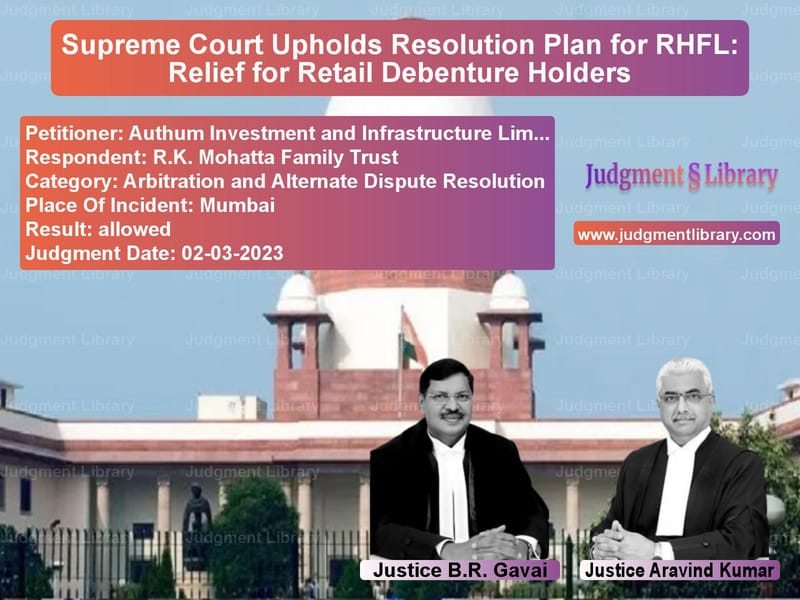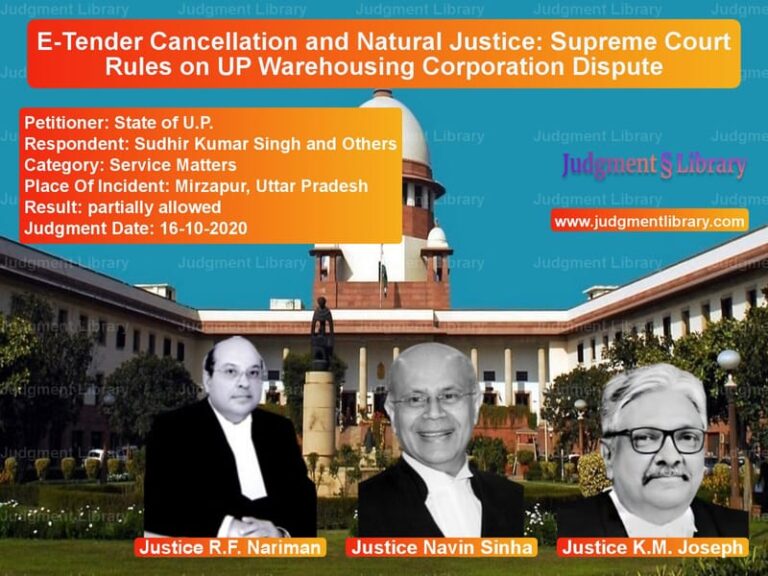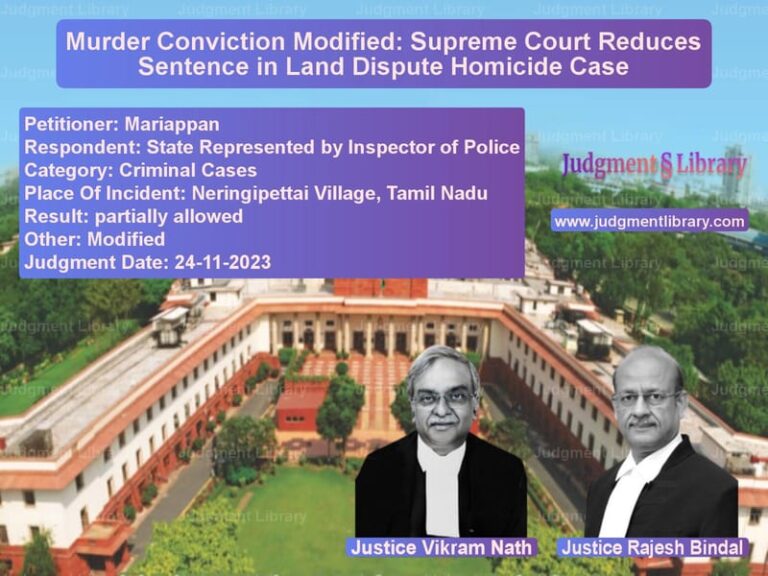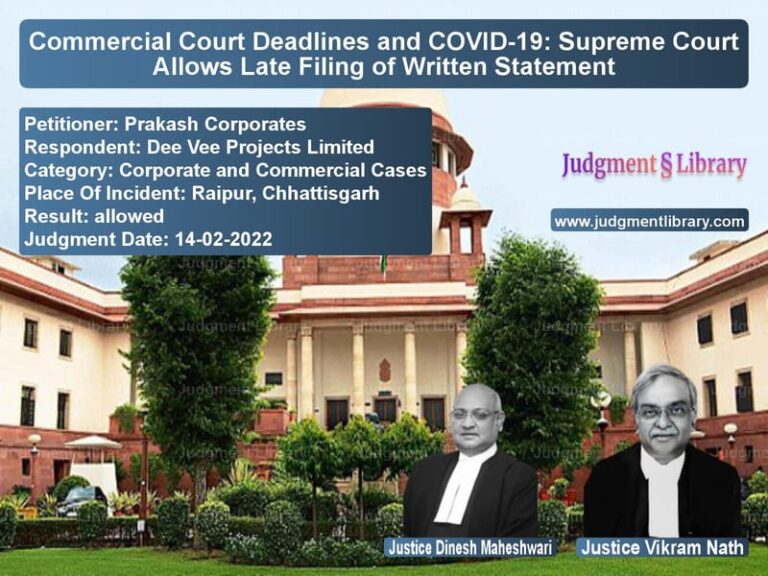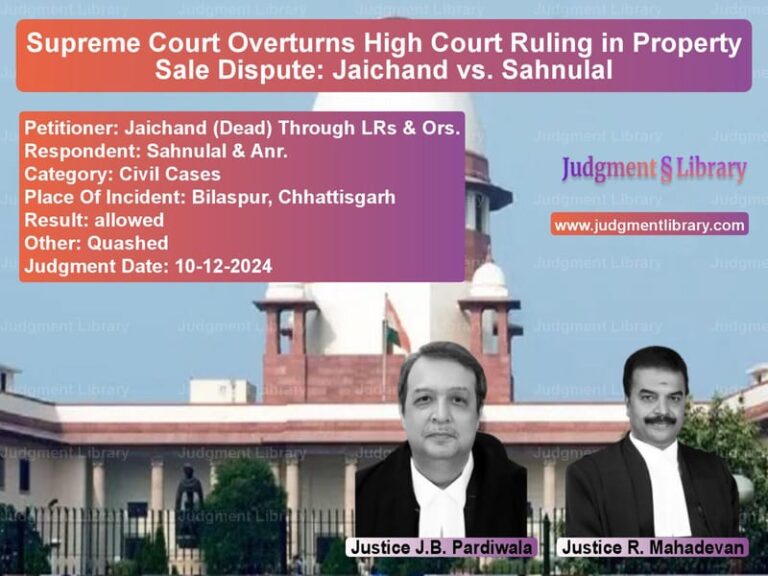Supreme Court Upholds Resolution Plan for RHFL: Relief for Retail Debenture Holders
The Supreme Court of India recently delivered a crucial judgment in the case concerning the approval of the Resolution Plan (RP) for Reliance Home Finance Limited (RHFL). The case revolved around whether the RP proposed by Authum Investment and Infrastructure Limited (AIIL) should be approved, given that it had already been supported by a vast majority of debenture holders and institutional creditors. This judgment closely aligns with the precedent set in Rajkumar Nagpal v. SEBI, where the Supreme Court upheld the enforcement of a similar RP for Reliance Commercial Finance Limited (RCFL), RHFL’s sister concern.
The appeals were filed by AIIL and RHFL against the Bombay High Court’s order, which had dismissed an application under Section 151 of the Civil Procedure Code, 1908 (CPC), seeking approval of the RP. The High Court ruled that it lacked the authority to approve the RP in the same manner as the Supreme Court did under Article 142 of the Constitution. This prompted AIIL and RHFL to approach the Supreme Court for relief.
Background of the Case
The case stemmed from financial distress faced by RHFL, which had defaulted on its obligations to various creditors. In response, a Resolution Plan was proposed by AIIL and subsequently approved by 96% of the Inter-Creditor Agreement (ICA) lenders. However, as the resolution process also required approval from debenture holders under a SEBI circular, the matter became contentious.
Initially, the Bombay High Court directed that a meeting of debenture holders be held to decide on the RP. Following this, voting was conducted, where 869 out of 919 debenture holders supported the RP, reflecting an overwhelming 94.55% approval rate. Despite this, procedural hurdles under the SEBI circular led to further legal complications.
Petitioner’s Arguments
AIIL and RHFL, represented by senior counsels Shri K.K. Venugopal and Shri Dhruv Mehta, argued that:
- The RP had already been approved by a vast majority of stakeholders, ensuring a fair resolution process.
- Similar relief was granted in the Rajkumar Nagpal case, where the Supreme Court exercised its powers under Article 142 to uphold an RP beneficial to debenture holders.
- Liquidation of RHFL would be detrimental to 19,353 small retail debenture holders, who were set to receive 100% of their principal amount under the RP.
- The High Court’s refusal to approve the RP created unnecessary uncertainty and prolonged the resolution process, causing harm to stakeholders.
Respondent’s Arguments
The respondents, including SEBI and certain dissenting debenture holders, countered these claims, arguing that:
- The SEBI circular explicitly mandated a specific approval process, requiring at least 75% of investors by value and 60% by number at the ISIN level, which was not met.
- Some debenture holders had abstained from voting, and their rights could not be ignored.
- Providing a blanket approval without offering dissenting debenture holders a choice would be unfair and legally questionable.
Supreme Court’s Judgment
The Supreme Court, after hearing both sides, noted that the facts of the case were nearly identical to those in the Rajkumar Nagpal judgment. The Court emphasized that small investors, particularly those with an exposure of up to Rs. 5 lakhs, would receive full repayment under the RP, ensuring fair treatment.
The Court cited key observations from the Rajkumar Nagpal judgment:
“Application of the SEBI Circular, though right in law, may lead to unjust outcomes for retail debenture holders if this Court were to reverse the entire course of action.”
Based on this, the Court ruled:
- The RP submitted by AIIL is approved, ensuring that retail debenture holders receive their dues.
- Dissenting debenture holders will have the option to either accept the RP or stand outside and pursue legal remedies.
- AIIL must complete the payment process before March 31, 2023.
Conclusion
The Supreme Court’s ruling in this case reaffirms its commitment to ensuring a fair resolution process while balancing the rights of all stakeholders. By extending relief under Article 142, the Court prevented delays that could have negatively impacted thousands of small investors. This judgment sets an important precedent for future cases involving financial restructuring and regulatory approvals.
Overall, the judgment provides much-needed clarity on how SEBI regulations interact with judicial interventions in financial matters, ensuring that legal frameworks support rather than hinder resolution efforts.
Petitioner Name: Authum Investment and Infrastructure Limited.Respondent Name: R.K. Mohatta Family Trust.Judgment By: Justice B.R. Gavai, Justice Aravind Kumar.Place Of Incident: Mumbai.Judgment Date: 02-03-2023.
Don’t miss out on the full details! Download the complete judgment in PDF format below and gain valuable insights instantly!
Download Judgment: authum-investment-an-vs-r.k.-mohatta-family-supreme-court-of-india-judgment-dated-02-03-2023.pdf
Directly Download Judgment: Directly download this Judgment
See all petitions in Arbitration Awards
See all petitions in Dispute Resolution Mechanisms
See all petitions in Institutional Arbitration
See all petitions in Enforcement of Awards
See all petitions in Judgment by B R Gavai
See all petitions in Judgment by Aravind Kumar
See all petitions in allowed
See all petitions in supreme court of India judgments March 2023
See all petitions in 2023 judgments
See all posts in Arbitration and Alternate Dispute Resolution Category
See all allowed petitions in Arbitration and Alternate Dispute Resolution Category
See all Dismissed petitions in Arbitration and Alternate Dispute Resolution Category
See all partially allowed petitions in Arbitration and Alternate Dispute Resolution Category

